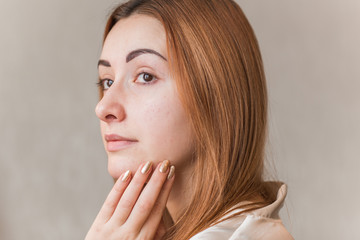Topical Retinoids For Sun-Damaged Skin
What are topical retinoids?
Topical retinoids are a group of prescription medications used to reverse some of the damaging effects of sun exposure over time. These medications are also used to treat acne. The active ingredient in most preparations is tretinoin. This is now available as a generic preparation; oother names are Retin-A and Renova (Renova is no longer available),
What beneficial effects will topical retinoids have on my skin?
Tretinoin (Refissa) is the only medication approved by the FDA for treatment of fine facial wrinkles, mottled facial hyperpigmentation (sun induced liver spots), and facial roughness. Regular use of this medication over time will lead to healthier appearing skin with improved texture and less wrinkles. It can replace dull-appearing skin with a pink rosy glow. In summary, if used over many months and years, tretinoin can reverse signs of excessive sun exposure.
How does tretinoin work?
Tretinoin will increase the number of new cells in the skin, increase blood supply, decrease the dark color of sun spots, and increase collagen production. The creams only work where applied and the active ingredient cannot be detected inside the body when applied to the face and hands. Nevertheless, female patients that are pregnant or become pregnant while using this medication should discuss use with an obstetrician before use.
When will I notice improvement?
You will begin to notice improvement over the first 4-8 weeks and even more benefit at 4 months and beyond. You should realize that changes occur slowly. These medications require monitoring by a physician, but are generally safe enough to continue for many years. People that have been using these medications for 5-10 years tend to look much younger than their actual age.
Will my insurance pay for this medication?
No. The medication is considered to be “cosmetic.” The approximate price of a large 60g tube is $89.00 in our clinic, which should last about 3 months.
Directions for use:
At bedtime, wash your face with a mild soap, pat dry and apply a small amount of tretinoin cream to your entire face. Start with a single small pea-size dab and spread this evenly over your forehead, cheeks and chin. Use caution when applying around the eyes, but you may apply a thin layer up to the lower eyelids and up to the upper eyelids at the outer corners of the eyes. Avoid application to the upper eyelids themselves. When applied near the eyes you may experience a mild burning sensation lasting about 30 seconds, this is due to the evaporation of the cream and is expected. There are no reported side effects of the cream entering the eyes. If the cream does get into your eye, you should flush it out with water. The neck may be treated as well. Use a thin layer on the neck below the jawline as this area can be more sensitive to irritation. Hands and forearms can also be treated if desired. Gradually, over the course of several months, you will increase the amount that you are applying to approximately three pea-size dabs. The amount will vary between people. If you get no redness, peeling, or flaking, then increase the amount you are applying. If you get too irritated, decrease the amount or take a night off.
Side effects of topical retinoids:
In the first few weeks of treatment you may experience a mild sensation of burning, stinging, redness and scaling. These effects are uncomfortable but temporary and usually will markedly lessen after the first few weeks of treatment. In fact, a mild degree of irritation (pink, flaking, and peeling) are early goals of treatment. If irritation is severe, decrease your applications to every 2nd or 3rd night and apply slightly less.
Will this medication make me more sensitive to the sun?
The package insert for tretinoin says that it causes sun sensitivity; however, there are no scientific studies to support this claim. We recommend the daily use of a sun screen every morning not because of sun-sensitivity (which is probably minimal if apparent at all) but because we want you to avoid further sun damage.
Suggested guidelines while you are using topical retinoids:
Wash treated areas no more than 3 times per day. In general, use mild soaps such as ZO facial cleanser or Vanicream Facial Cleanser. Avoid scrubbing. Avoid astringents, aftershaves and excessive regular use of exfoliating agents. Also avoid excessive exposure to wind and cold. All of these can cause dryness and lead to increased irritation with use of the medication. Avoid activities that could cause sweating immediately after application of the medication. Apply a sunscreen with SPF of 30 or greater every morning, regardless of weather, season or the planned activities of the day. Both the moisture and sun protection are critical to maximal effect of this medication. Select a sunscreen with UVA and UVB blocking properties. Vanicream and Elta are outstanding product lines. As noted, OTC retinols are not as effective, but InstaNatural and Differin are two OTC retinol options. This might be for people that cannot tolerate any prescription strength product due to redness and dryness.
Price at Dermatology of North Asheville: 60g tube for $89, the commercially available tube is 45g and the price varies tremendously among pharmacies. Over-the-counter (OTC) options include retinol, which is not as strong and therefore not as effective as prescription strength.





